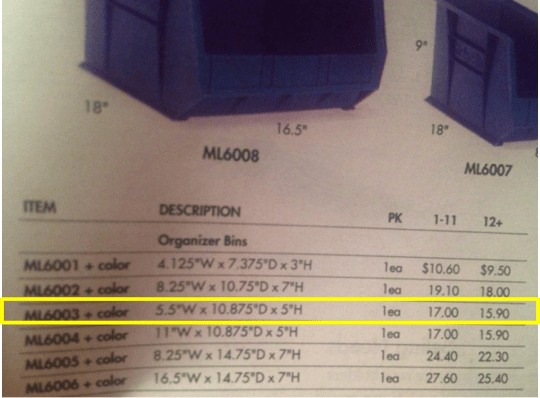Back in 2007, I published a post about the disparity in pricing for blue plastic bins that are often used for Lean “5S” practices or just for general shelf storage.
In 2007, the SAME plastic bin was $4.55 in the Grainger industrial catalog, but it was a whopping $13 in a hospital lab equipment catalog.
I received this same company's lab catalog in the mail the other day. We can see inflation from 2007 and a growing price disparity for bins of the exact same material and dimensions.
Grainger = $7.04
Lab Catalog = $17
I swear, if you held these two bins side by side, you wouldn't be able to tell the difference because they are the exact same bin made by the exact same manufacturer, Akro-Mils.
To hospitals… please stop throwing money away through uninformed purchasing. Don't get ripped off by vendors who want to charge you more because you are in healthcare. Grainger will get an account for your hospital, if you don't already have one. I've helped many hospital clients get signed up with Grainger to order online or go buy from a local store/warehouse (Grainger does not sell to consumers directly).
You can probably also find better prices out there from different online 5S vendors. In 2007, 5Sstore.com was offering the same bin for just $3.38.
If you're buying hundreds of these bins, that's a huge opportunity for improvement – getting a lower price for the same thing.
Other stores today:
- 5Sstore.com (a former sponsor)
- 5S Supply (also a former sponsor)
- 5S Today (current sponsor via Creative Safety Supply)
Who can find the best price?
Please scroll down (or click) to post a comment. Connect with me on LinkedIn.
Let’s build a culture of continuous improvement and psychological safety—together. If you're a leader aiming for lasting change (not just more projects), I help organizations:
- Engage people at all levels in sustainable improvement
- Shift from fear of mistakes to learning from them
- Apply Lean thinking in practical, people-centered ways
Interested in coaching or a keynote talk? Let’s talk.
Join me for a Lean Healthcare Accelerator Trip to Japan! Learn More












Global Industrial also features a wide variety of bins at very competitive prices.
Completely agree with you on bins and many similar items, especially when a great company like Grainger is involved – I’ve used them many times.
But sometimes there are other dynamics at play. A smart business obtains business liability insurance for its products, and I know from personal experience that when signing up for such insurance you have to specify what markets you are selling into. Depending on the type of product, which sometimes can include seemingly innocuous products like bins, the insurance rates can rise dramatically for certain markets – high liability potential ones like medical especially. That cost has to be covered… usually in pricing. I know one company that makes a specialized product that sells the exact same product for $8 for non-medical and $120 for medical use – and they’ve demonstrated to us it is because of insurance and other potential liability costs. The non-medical use is very price competitive so they’ve decided not to spread medical insurance adder costs across the entire product line. That 15x is the biggest extreme I’ve seen, but a 10-50% increase is fairly common. Doesn’t make it right, but it is what it is.
Thanks for that insight, Kevin.
That said, I’d recommend that hospitals try to find lower priced options where they can and where it doesn’t introduce any risk to quality and safety. And storage bins is definitely one of those categories.
Sorry for the delay in getting to this post, Mark. This is one of the outrageous realities that has irritated me since my days purchasing for clinical laboratories. And when I set up kanban across a large SoCal hospital, I got to see unit and bulk prices for every single surgical and ICU item they carried. It was sickening what they were paying for items that you and I pay pennies for.
I truly believe there should be a law that prevents suppliers and distributors from offering the same product at dramatically different prices. Maybe they could be allowed a 20% swing or something like that but not $7-$17. This is also the problem w/ middleman business relationships.
If businesses did the right thing, we wouldn’t need government regulation. But since many don’t operate fairly, this is where I believe our government provides the greatest value.
I respectfully disagree that any government regulation would help. “Buyer beware” certainly applies and hospitals need to wise up.
Comments are closed.